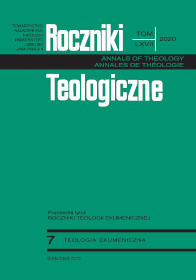Almighty God and Unfree Will: Key Motives of Luther’s Theology in the Interpretation of Contemporary Researchers of His Legacy
Abstract
The article focuses on two topics of Martin Luther’s theology — his vision of God and the understanding of freedom of will. It does so through the prism of two contemporary interpretations of the Reformer’s theology prepared by Oswald Bayer and Hans-Martin Barth, reputable researchers of Martin Luther. Their analyses, which differ in their perspective and order, show the theology of Martin Luther as imbued with the radical vision of an almighty God and passive man who has no freedom of will regarding salvation. These reconstructions were inscribed in the diagnosis of key structures of Martin Luther’s theology by Albrecht Beutel: its rooting in the Christocentric interpretation of the Bible, its understanding in terms of the art of discrimination, and its basing on experience.
References
Barański Łukasz, Sojka Jerzy: Reformacja, t. 1-2, Bielsko-Biała: Wydawnictwo Augustana 2016-2017.
Barth Hans-Martin: Der Teufel und Jesus Christus in der Theologie Martin Luthers, Göttingen: Vandenhoeck & Ruprecht 1967.
Barth Hans-Martin: Die Theologie Martin Luthers: Eine kritische Würdigung, Gütersloh: Gütersloher Verlag-Haus 2009.
Barth Hans-Martin: The Theology of Martin Luther: A Critical Assessment, Minneapolis: Fortress Press 2013.
Bayer Oswald: Martin Luthers Theologie. Eine Vergegenwärtigung, Tübingen: Mohr Siebeck 20042.
Bayer Oswald: Martin Luther’s Theology: A Contemporary Interpretation, Grand Rapids, MI: Eerdmans 2008.
Bayer Oswald: Promissio. Geschichte der reformatorischen Wende in Luthers Theologie, wyd. 2, Göttingen: Vandenhoeck & Ruprecht 1971.
Beutel Albrecht: Theologie als Erfahrungwissenschaft, w: Luther Handbuch, red. Albrecht Beutel, wyd. 2, Tübingen: Mohr Siebeck 2010, s. 454-459.
Beutel Albrecht: Theologie als Schriftauslegung, w: Luther Handbuch, red. Albrecht Beutel, wyd. 2, Tübingen: Mohr Siebeck 2010, s. 444-449.
Beutel Albrecht: Theologie als Unterscheidungslehre, w: Luther Handbuch, red. Albrecht Beutel, wyd. 2, Tübingen: Mohr Siebeck 2010, s. 450-454.
Breviarium fidei. Wybór doktrynalnych wypowiedzi Kościoła, red. Ignacy Bokwa, Poznań: Drukarnia i Księgarnia Świętego Wojciecha 2007.
Cruciger Elisabeth, Jedyny Synu Boży, w: Śpiewnik ewangelicki, Bielsko-Biała: Wydawnictwo Augustana 2002, nr 107.
D. Martin Luthers Werke: Kritische Gesamtausgabe. Abteilung Deutsche Bibel, Weimar: Böhlau 1906-1961.
D. Martin Luthers Werke: Kritische Gesamtausgabe. Abteilung Tischreden, Weimar: Böhlau 1912-1921.
D. Martin Luthers Werke: Kritische Gesamtausgabe, Weimar: Böhlau 1883-2009.
Dieter Theodor: Der junge Luther und Aristoteles, Berlin–New York: de Gruyter 2001.
Dieter Theodor: Luther as Late Medieviel Theologian. His Positive and Negative Use of Nominalism and Realism, w: The Oxford Handbook of Martin Luther’s Theology, red. Robert Kolb, Irene Dingel, L’ubomír Batka, Oxford: Oxford University Press 2014, s. 31-48.
Dieter Theodor: Luther und die Philosophie, w: Luther, Katholizität und Reform. Wurzeln – Wege – Wirkungen, Padeborn–Leipzig: Evangelische Verlagsanstalt 2016, s. 60-88.
Duży katechizm, w: Księgi wyznaniowe Kościoła Luterańskiego, wyd. 3, Bielsko-Biała: Wydawnictwo Augustana 2011, s. 57-131.
Kaufmann Thomas: Geschichte der Reformation, Frankfurt am Main–Leipzig: Verlag der Weltreligionen 2009.
Lichtner Irena: Afirmacja życia. Kwestia doczesności w teologii Marcina Lutra, Dzięgielów: Wydawnictwo Warto 2012.
Luter Marcin: O niewolnej woli, przeł. Wiktor Niemczyk, Świętochłowice: Towarzystwo Upowszechniania Myśli Reformowanej „Horn” 2002.
Luter Marcin: Wyznanie o Wieczerzy Pańskiej, przeł. Józef Pośpiech, wyd. 2, Bielsko-Biała: Wydawnictwo Augustana 2014.
Lutherische Identität. Lutheran Identity, red. Theodor Dieter, Leipzig: Evangelische Verlagsanstalt 2019. Luterańska tożsamość. Trzy zestawy tez dotyczących tożsamości luterańskie, nr 78, w: Luterańska tożsamość i ekumenizm, red. J. Sojka, Warszawa: Wydawnictwo Warto 2020, s. 19-111.
Melanchton Philipp: Loci communes 1521. Lateinisch-deutsch, przeł. Horst-Georg Pöhlmann, wyd. 2, Gütersloh: Gütersloher Verlag-Haus 1997.
Niemczyk Wiktor: Kontrowersja dogmatyczna między Erazmem a Lutrem na temat wolności ludzkiej woli, w: Teologia wiary. Teologia ks. Marcina Lutra i ksiąg wyznaniowych Kościoła Luterańskiego, red. Manfred Uglorz, Bielsko-Biała: Wydawnictwo Augustana 2007, s. 180-202.
Niemczyk Wiktor: Wstęp, w: Marcin Luter, O niewolnej woli, przeł. Wiktor Niemczyk, Świętochłowice: Towarzystwo Upowszechniania Myśli Reformowanej „Horn” 2002, s. 11-36.
Oberman Heiko A.: Marcin Luter. Człowiek między Bogiem a diabłem, przeł. Elżbieta Adamiak. Gdańsk: Wydawnictwo Marabut.
Pesch Otto Hermann: Theologie der Rechtfertigung bei Martin Luther und Thomas von Aquin, Mainz: Matthias-Grünewald-Verlag 1967.
Schilling Heinz: Marcin Luter. Buntownik w czasach przełomu, przeł. Jerzy Kałążny, Poznań: Wydawnictwo Nauka i Innowacje 2017.
Wspólna deklaracja w sprawie nauki o usprawiedliwieniu, w: Bliżej wspólnoty. Katolicy i luteranie w dialogu 1965-2000, red. Karol Karski, Stanisław Celestyn Napiórkowski, Lublin: TN KUL 2003, s. 499-512.
Wyznanie augsburskie, w: Księgi wyznaniowe Kościoła Luterańskiego, wyd. 3, Bielsko-Biała: Wydawnictwo Augustana 2011, s. 143-163.
Copyright (c) 2020 Roczniki Teologiczne

This work is licensed under a Creative Commons Attribution-NonCommercial-NoDerivatives 4.0 International License.





